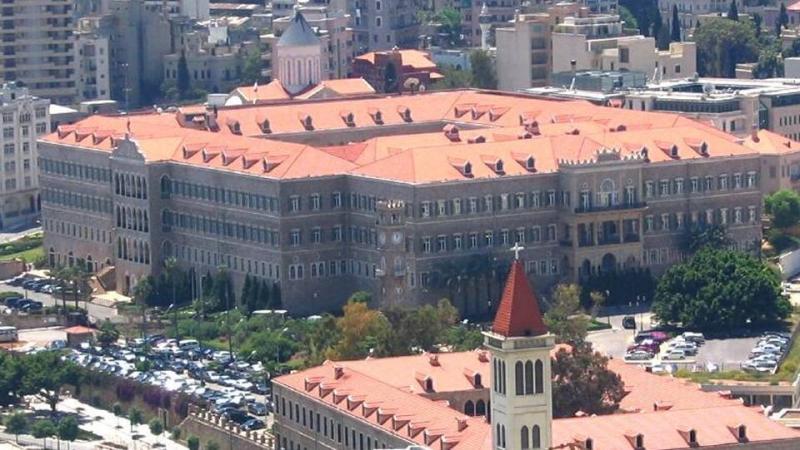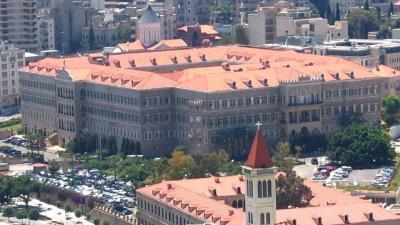The Secretary-General of Hezbollah, Hassan Nasrallah, has joined the optimists regarding the rehabilitation of the caretaker government in Lebanon through renewed parliamentary confidence, which is expected to happen in the coming days following the return of the designated Prime Minister Najib Mikati from New York. Its establishment may occur before the scheduled parliamentary session on Monday, dedicated to approving the budget for the current year, indicating that reviving the government will take precedence over achieving the presidential election deadline by electing a new president to replace the current Michel Aoun before the end of his term on October 31. However, forecasts suggest that the presidential election will be postponed because the balance of power in parliament does not allow one team to dominate the election, thus requiring international and regional support that is not currently assured.
A prominent parliamentary source revealed to "Asharq Al-Awsat" that Mikati met with the Speaker of Parliament Nabih Berri immediately after returning from Baabda, following his meeting with Aoun, expressing his optimism about overcoming the obstacles hindering the rehabilitation of the current government. He anticipates its revival in the coming days, potentially as soon as Saturday, provided he returns early from New York unless an unexpected event forces a reshuffling of cards. He believes that there’s little likelihood of any delays in its revival, especially since Nasrallah has intervened to address potential obstacles by suggesting minor amendments, including replacing a few ministers without expanding the cabinet to include six state ministers.
The parliamentary source denied rumors that Berri is inclined to replace Finance Minister Youssef Khalil with former MP Yassine Jaber, who is highly qualified and has sufficient experience in financial matters, asserting there is no issue with Khalil, given his expertise. He clarified that the problem pertains to the government's lack of financial and economic vision, which must address the confusion it has created for itself and be clear about its goals.
In this context, another prominent political source noted that the potential cabinet reshuffle could involve the Ministers of Economy Amine Salam and Displaced Affairs Issam Charafeddine, unless Aoun wishes to replace just a few ministers aligned with him. He indicated that Aoun might nominate former minister Saleh Gharib as a replacement for Charafeddine while retaining the right to name the Sunni minister to replace Salam, but only after agreeing on the government's rehabilitation and before issuing the related decrees.
The new Sunni minister is expected to be from Akkar, and Aoun has somehow sought the opinion of the "Moderation" parliamentary bloc, which has not opposed the name he suggested. However, the source anticipated Mikati's reluctance to proceed without a change to the current ministerial lineup, insisting that he must replace these two ministers, or else consultations for government formation would revert to square one.
The political source emphasized that Nasrallah played a role in convincing Aoun and his political heir, MP Gibran Bassil, to facilitate Mikati's mission and negotiate with him. He stated that the party’s official for mobilization and coordination, Wafiq Safa, is in constant contact with them. Before Mikati's last visit to Baabda, he met with them to deliver a message from Nasrallah urging them to withdraw their reservations about rehabilitating the government, starting with Aoun's request for its expansion. The only actionable item in Nasrallah's recent speech pertained to reviving the government to avoid a presidential vacuum amid a caretaker government, which would plunge the country into chaos.
The source noted that Nasrallah seeks to stabilize the situation through the government's revival and prevent the country from sliding into disorder. He indicated that Bassil has no choice but to comply with his ally's insistence on expediting the formation of the current government based on renewed parliamentary confidence, as he understands that Bassil today, before Aoun's term ends, is not the same as he will be once Aoun leaves Baabda for his home in Rabieh.
This same source asserted that Bassil's response to Nasrallah's request signifies he is not in a position to threaten street protests over the failure to transfer Aoun's powers to a caretaker government. He noted that his ally has saved him since the situation of the "Free Patriotic Movement," following the expulsion of former MPs Ziad Aswad and Mario Aoun, does not allow him to rally his supporters effectively. Furthermore, the "Strong Lebanon" bloc does not align with him because of disagreements with several MPs due to mismanagement of the municipal elections, the repercussions of which are still being felt silently within the Aounist and parliamentary spheres.
Therefore, placing the revival of the government on the fast track, as the political source describes it, will lead to Aoun's departure from Baabda immediately after his term without dragging the country into security turmoil. However, rehabilitating the government does not imply that the political path is clear for electing a new president on schedule. Opinions diverge between one faction that argues the government’s revival will hasten the presidential election process and another that views it merely as a consolation prize to maintain minimal stability until regional and international conditions permit the election, albeit late.
Delaying the presidential election appears inevitable because the balance of power in the parliament does not allow any faction to secure a two-thirds majority in the first round of voting for the presidency, or a simple majority of 65 votes in the second round, given that the candidate must achieve a minimum of half the MPs plus one vote. Moreover, even if the balance of power prevents any faction from securing their candidate's victory, the opposing faction can undermine the session by withdrawing their representatives, depriving it of the constitutional quorum required for convening.
Thus, both the resistance bloc and the parliamentary majority, distributed across various factions, attempt to unify their stance around a specific candidate, though it is challenging for them to form a united parliamentary bloc. These factions hold the power to obstruct and equally wield the veto to prevent the first session for electing the president from taking place. Berri has warned of this in his response during the last parliamentary session to MP Paula Yacoubian, stating he is ready to call for deputies to convene a presidential election session if he senses a willingness to reach consensus.
The Speaker calls for consensus on electing a president rather than absolute agreement, which is difficult to achieve, yet consensus remains unattainable as of now. Recently, his ally Hassan Nasrallah joined in emphasizing the importance of accomplishing this milestone on schedule and supporting calls for an agreement regarding the president, advocating for meetings devoid of challenges and vetoes.
Therefore, the call by the Shiite duo for consensus on a president may lead to the exclusion of natural candidates for the presidency and remove them from the race, opening the door for a potential reshuffling of the cards as a compulsory pathway to agree on a presidential candidate. This is particularly relevant as failing to elect a president within the constitutional timeframe has become certain, and the achievement of the election will be delayed, possibly indefinitely, subject to potential surprises. Nonetheless, it will require regional and international support, which should eventually materialize with the involvement of external powers concerned with the election facilitating local communications to shape the profile of the upcoming president. Although some believe that interventions may have begun, they are still limited and confined to a narrow scope that should expand to release the presidential election process.




